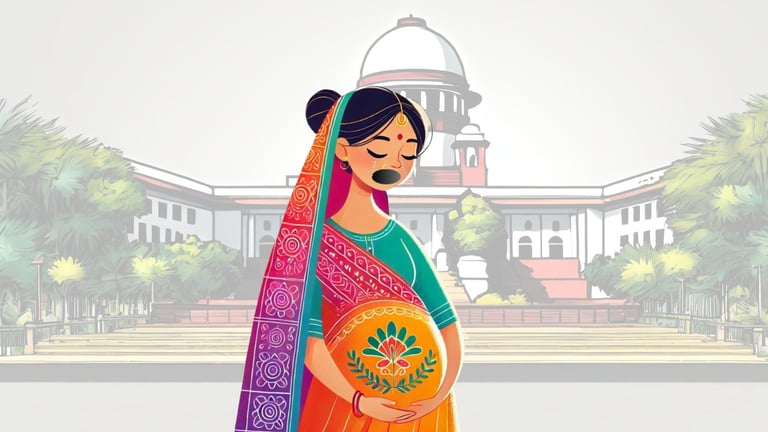Abortion Laws in India
Pratiksha Tripathi
University Institute of Legal Studies Chandigarh University, Punjab
This blog is written by Pratiksha Tripathi, a Third-Year Law student of University Institute of Legal Studies Chandigarh University, Punjab


Introduction
In Ancient times, India has witnessed many illegal practices, and among all one of the major and critiqued performed practices is Abortion, which denotes the discontinuance of pregnancy by medical ways like with the help of Drugs or Surgery. Undoubtedly, this is a need of helpless women and they choose it as the only alternative option to protect themselves from society whether they belong to an urban or rural area. In most cases, women belonging to urban areas were enough privileged to avail of safe and right abortion Facilities but on the other hand, Women belonging to rural areas were unable to do so due to a lack of Illiteracy and awareness. From before the period of 1947 till today India has made progress regarding Abortion laws.
The Pre-Independence Era
The Evolution of Abortion law and reproductive justice has taken over 50 years to be rooted in Indian Law. Before 1947, all the concerns of the governing authorities for the termination of women's pregnancy are present until the death of pregnant women.
All the emerging Laws related to abortion are based on the ideologies of criminal law, which means the Criminalization of Abortion and controlling the population of the Country. The scope of laws made in Colonial India was very limited to its extent.
Till the period of 1960s, Indian law penalized the acts of Pregnant women or the person who helped them (medical practitioners) which also covers the acts of Voluntarily or Intentionally miscarriage of pregnant women with or without her consent under Section 312 of the Indian Penal Code which define the abortion as an illegal and punishable offense until and unless it is done by the person in good faith to save the life of pregnant women.
Evolving Era’s
When India got its Independence in 1947, people slowly got to realize the rights and protections availed for women which were not enough to uplift their position in the country. The Underdeveloped laws and understanding of mental cruelty and the mental health of women need to be developed. Cruelty here refers to the mental illness from a woman went through if she is a victim of rape, Marital Rape, Unwanted pregnancy of a married woman, rape of a minor, etc. There are many cases present in this world that need to be settled down and the law should be liberalized in the matter of abortion or termination of pregnancy. The people started protesting for the reproductive rights of women.
As a result, the Government of India in 1964 formed the Shantilal Shah committee to find out whether there was an actual need to modify the abortion laws in India or not. The report propounds the need for liberty in Abortion laws to reduce unsafe and illegal abortions control the population and better family planning using Abortion.
After this report, the Parliament in its 22nd year of the Republic of India passed the Medical Termination of Pregnancy Act, on the 10th of August 1971.
The preface of the MTP act states that the discontinuation or termination of pregnancy can only be done by the registered medical practitioner who possesses any recognized medical qualification as defined in clause (h) of section 2 of the Indian Medical Council Act, 1956, (102 of 1956), whose name has been entered in a State Medical Register and who has such experience or training in gynecology and obstetrics as may be prescribed by rules made under this Act.
The main issue propounds with this act is that act only considers the discontinuation of pregnancy of married and widowed women and the law does not consider the situation of unmarried women as this is a crucial and highly advanced procedure, the law shifts the power of decision making from a mother of a child which is in her womb to the Recognized medical practitioner (RMP) to determine in their discretion that whether the Abortion should be provided or not?
Current times
India’s Legal sights on abortion laws are becoming progressive with a large consideration if we compare to several countries including the United States where at present and in back times abortion is restricted.
India is still developing with fluctuating legal backgrounds and emerging laws, and the policies for women are changing from time to time as per needs and arising circumstances. By changing generations people on their own started giving importance to Sex education by understanding the importance of it. The government is also implementing various policies to protect women’s rights and made certain amendments like the recent amendment of the Medical Termination Pregnancy Act, 2021 with these now unmarried women can also seek Abortion in the failure of contraceptive medications. Also, the recent amendment maintains the confidentiality of women and infringement of which can cause imprisonment of up to 1 year and both.
REFERENCES
· ‘Abortion in India: Legal Framework and Women's Rights’ (PRS Legislative Research, 20 April 2022) https://prsindia.org/article/abortion-in-india-legal-framework accessed 7 September 2024.
· 'Abortion in India' Wikipedia (Wikipedia, 24 September 2021) https://en.wikipedia.org/wiki/Abortion_in_India accessed 7 September 2024.
· Medical Termination of Pregnancy Act 1971, s 3(2).
· Sneha Bhardwaj, Abortion Law in India: A Critical Analysis (Oxford University Press 2020).
· Suman Gupta, 'Revisiting the Medical Termination of Pregnancy Act, 1971: An Analysis of Abortion Laws in India' (2021) 13 Indian Journal of Law and Justice 45.
